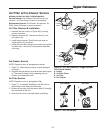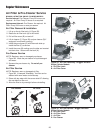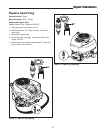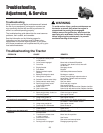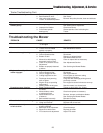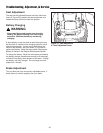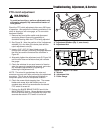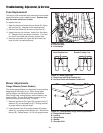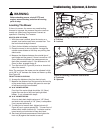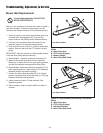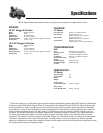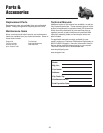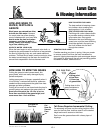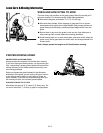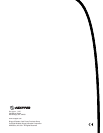
35
Specifications
ENGINE:
20 HP* Briggs & Stratton
Make Briggs & Stratton
Model Intek
Horsepower 20 @ 3600 rpm
Displacement 30.5 Cu. in (582cc)
Electrical System 12 Volt, 9 amp. Alternator, Battery: 230 CCA
Oil Capacity 64 Oz. (1.9 L)
18.5 HP* Briggs & Stratton
Make Briggs & Stratton
Model Intek
Horsepower 18.5 @ 3600 rpm
Displacement 38 Cu. in (502 cc)
Electrical System 12 Volt, 9 amp. Alternator, Battery: 230 CCA
Oil Capacity 48 Oz. (1.4 L)
CHASSIS:
LT Series
Fuel Tank Cap. Capacity: 3.5 Gallons (13,2 L)
Rear Wheels Tire Size: 22 x 10 -8
Inflation Pressure: 10 psi (,68 bar)
Rear Wheels Tire Size: 20 x 8.0 -8
Inflation Pressure: 10 psi (,68 bar)
Front Wheels Tire Size: 15 x 6.0-6
Inflation Press.: 12-14 psi (,82-0,96 bar)
TRANSMISSIONS:
K46
Type Hydrostatic Tuff Torq K46
Hydraulic Fluid 10w 30 Premium Engine Oil
Speeds Forward: 0-5.5 MPH (9.0 km/h)
@ 3400 rpm Reverse: 0-3.0 MPH (4.6 km/h)
Continuous Torque 170 ft. lbs.
Output
Drawbar Rating 227 lbs (103 kg)
Maximum Weight 675 lbs (306 kg)
on Axle
DIMENSIONS:
LT Series
Overall Length 72”
Overall Width 37”
Height 45”
Weight
18.5hp Tractor
w/ 38” Mower Deck 480 lbs. (218 kg)
20hp Tractor
w/ 44” Mower Deck 532 lbs. (241 kg)
NOTE: Specifications are correct at time of printing and are subject to change without notice.
* The power ratings for an individual engine model are initially developed by starting with SAE (Society of Automotive
Engineers) code J1940 (Small Engine Power & Torque Rating Procedure) (Revision 2002–05). Given both the wide
array of products on which our engines are placed, and the variety of environmental issues applicable to operating
the equipment, it may be that the engine you have purchased will not develop the rated horsepower when used in a
piece of power equipment (actual “on–site” power). This difference is due to a variety of factors including, but not
limited to, the following: differences in altitude, temperature, barometric pressure, humidity, fuel, engine lubrication,
maximum governed engine speed, individual engine to engine variability, design of the particular piece of power
equipment, the manner in which the engine is operated, engine run–in to reduce friction and clean out of combustion
chambers, adjustments to the valves and carburetor, and other factors. The power ratings may also be adjusted
based on comparisons to other similar engines utilized in similar applications, and will therefore not necessarily match
the values derived using the foregoing codes.



